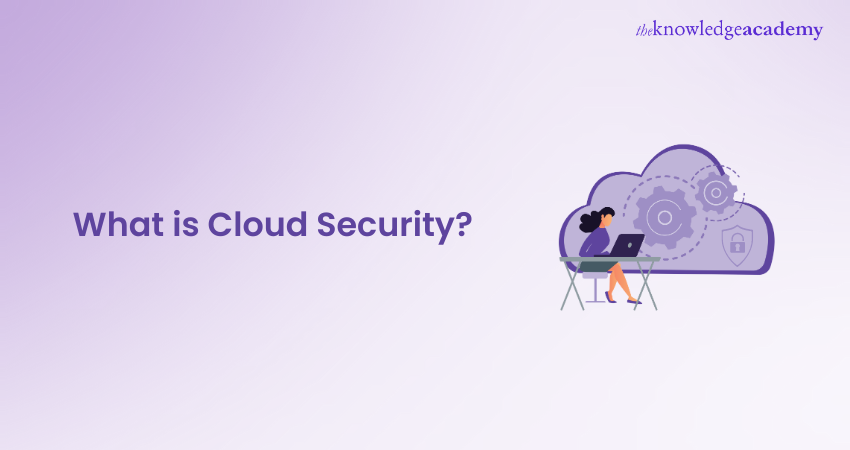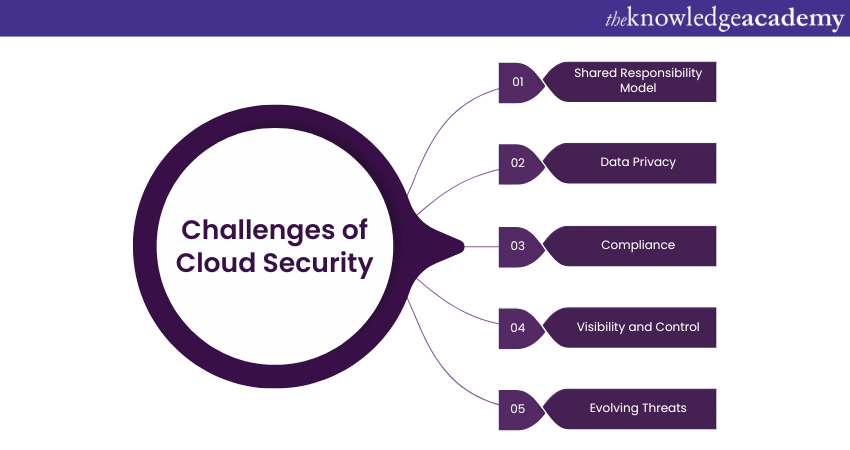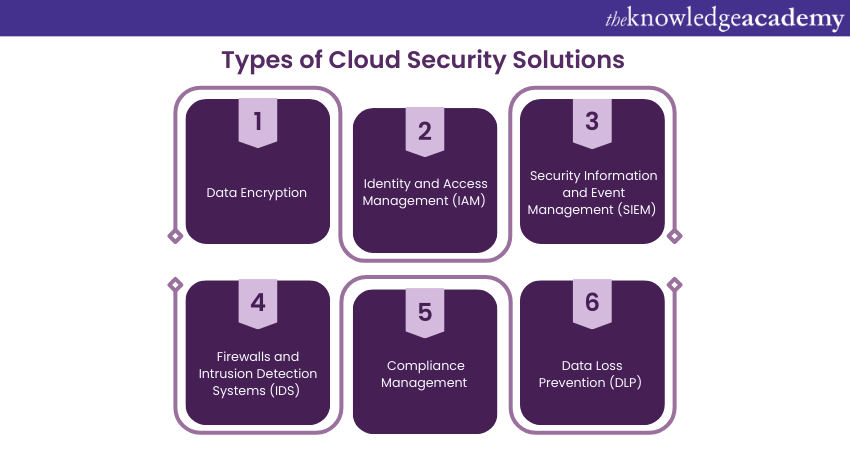We may not have the course you’re looking for. If you enquire or give us a call on 01344203999 and speak to our training experts, we may still be able to help with your training requirements.
We ensure quality, budget-alignment, and timely delivery by our expert instructors.

Soar into the world of cloud technology with us as we answer the pivotal question: “What is Cloud Security?” It’s the invisible shield guarding your precious data in the boundless skies of the internet. In this blog, we lay out the basics of Cloud Security, highlighting its importance as the guardian of our digital treasures.
We’ll navigate the turbulent obstacles that Cloud Security encounters and reveal the ingenious strategies crafted to shield our data. Ready for takeoff? Let’s start this enlightening journey to understand how Cloud Security keeps our heads worry-free in the clouds!
Table of Contents
1) Decoding What is Cloud Security?
2) Importance of Cloud Security
3) Challenges of Cloud Security
4) Types of Cloud Security Solutions
5) Difference between Cloud Security and Cloud Computing
6) Conclusion
Decoding What is Cloud Security?
Cloud Security is the practice and technology designed to safeguard data, applications, and services hosted in the cloud from various threats. As businesses increasingly migrate to cloud environments, ensuring the security of these assets becomes important. Cloud Security covers a wide range of measures, including data encryption, identity and access management, threat detection, and compliance monitoring. These measures work together to protect cloud-based resources from unauthorised access and other cyber threats.
Importance of Cloud Security
Cloud Security is critical for several reasons:
a) Data Protection: Safeguarding sensitive data stored in the cloud is essential to prevent unauthorised access and data breaches. This includes personal information, financial data, and intellectual property.
b) Compliance: Industries are subject to strict regulatory requirements regarding data protection. Cloud Security helps businesses comply with these regulations and avoid legal penalties.
c) Trust and Reputation: A strong Cloud Security posture builds trust with customers and partners, demonstrating that a business takes data protection seriously. A security breach can affect a company's reputation and customer confidence.
d) Business Continuity: Effective Cloud Security ensures that businesses can quickly recover from security incidents, minimising downtime and maintaining operations.
Challenges of Cloud Security
While Cloud Security is essential, it comes with several challenges:

a) Shared Responsibility Model: In cloud environments, both the cloud service provider and the customer share security responsibilities. Understanding and managing these shared responsibilities can be complex.
b) Data Privacy: Ensuring the privacy of Data in the cloud can be challenging, especially when data is stored in multiple locations or accessed by various third parties.
c) Compliance: Meeting regulatory requirements in different jurisdictions can be difficult, as cloud environments often span multiple regions.
d) Visibility and Control: Gaining visibility into cloud environments and maintaining control over security configurations can be challenging, particularly in large, complex deployments.
e) Evolving Threats: Cyber threats are evolving, and cloud environments can be attractive targets for attackers. Keeping ahead of these threats requires ongoing monitoring and updating of security measures.
Learn how to implement a storage bucket with our Google Cloud Storage Training – join today!
Types of Cloud Security Solutions
Different types of Cloud Security solutions include:

Data Encryption
Encrypting data at rest and in transit allows safeguard it from unauthorised access. Encryption ensures that even if data is intercepted, it cannot be read without the proper key to unlock it. This means that sensitive information remains secure. It is a fundamental aspect of Cloud Security. Encryption is essential for maintaining data privacy and compliance.
Identity and Access Management (IAM)
IAM solutions manage and control access to cloud resources. They check that only authorised users can access specific data and applications. This prevents unauthorised access and potential data breaches. IAM includes features like Multi-factor Authentication (MFA) and role-based access control. It is crucial for maintaining secure and organised access to cloud services.
Security Information and Event Management (SIEM)
SIEM solutions give real-time monitoring and analysis of security events. They help find and respond to potential threats quickly. SIEM systems analyse data from various sources to identify suspicious activities. They also assist in compliance reporting. It is essential for maintaining a secure cloud environment.
Firewalls and Intrusion Detection Systems (IDS)
Firewalls and IDS protect cloud environments from unauthorised access and attacks. They check incoming and outgoing network traffic to detect and block threats. A Firewall is a barrier between trusted and untrusted networks. IDS identify potential security breaches and alerts administrators. These tools are critical for safeguarding cloud infrastructure.
Compliance Management
Compliance management tools help businesses meet regulatory requirements. They provide visibility into compliance status and automate compliance reporting. This ensures that companies adhere to industry standards and legal obligations. Compliance management minimises the risk of legal penalties. It also develops trust with customers and stakeholders by demonstrating a commitment to data protection.
Data Loss Prevention (DLP)
DLP tools safeguard sensitive data from being accidentally shared, accessed, or stolen. They monitor and control data transfers to prevent unauthorised exposure. DLP solutions help ensure that confidential information remains secure. They are vital for protecting intellectual property and personal data. Implementing DLP measures is crucial for maintaining data integrity and security.
Difference between Cloud Security and Cloud Computing
Cloud Computing and Cloud Security are two terms that often come up together, but they refer to different aspects of working with cloud technology.
|
Aspect |
Cloud Computing |
Cloud Security |
|
Definition |
Delivery of services over the internet (data storage, servers, databases, networking, and software). |
Protection of cloud-based systems, data, and infrastructure. |
|
Focus |
Flexible resources, faster innovation, economies of scale. |
Safeguarding data from theft, leakage, and deletion. |
|
Components |
Data storage, servers, databases, networking, software. |
Policies, controls, procedures, and technologies for protection. |
|
Cost |
Pay only for services used, lowers operating costs. |
Involves investment in security measures to protect data. |
|
Purpose |
Efficiently running infrastructure and lowering costs. |
Protecting data and systems from security threats. |
Cloud Computing is a broad term that includes the delivery of services over the internet, including data storage, servers, databases, networking, and software. It allows for flexible resources, faster innovation, and economies of scale. Users pay only for their cloud services, helping lower operating costs and run infrastructure more efficiently.
Cloud Security, on the other hand, is a subset of Cloud Computing that focuses on protecting cloud-based systems, data, and infrastructure. It involves policies, controls, procedures, and technologies that work together to protect cloud-based systems. Cloud Security is concerned with safeguarding data from theft, leakage, and deletion.
Both are essential for businesses moving to cloud environments, but they serve different purposes within the ecosystem.
Learn how to secure GCP network infrastructure with our Introduction to Google Cloud Security Course – join today!
Conclusion
Cloud Security is an important aspect of modern computing, ensuring that data, applications, and services hosted in the cloud are protected from various threats. As businesses focus on cloud environments, understanding and implementing effective Cloud Security measures is critical. Understanding "What is Cloud Security?" helps highlight the importance of securing cloud-based assets in today's digital landscape.
Learn hands-on strategies to protect sensitive data with our CCSP Certified Cloud Security Professional Course – join today!
Frequently Asked Questions
Is Cloud Security Expensive?

The cost of Cloud Security depends on the solutions and measures implemented. However, investing in Cloud Security is crucial to protect sensitive data and prevent costly breaches.
Can Small Businesses Benefit from Cloud Security Solutions?

Yes, small businesses can benefit greatly from Cloud Security solutions. These solutions help safeguard sensitive data and maintain customer trust, regardless of the business size.
What are the Other Resources and Offers Provided by The Knowledge Academy?

The Knowledge Academy takes global learning to new heights, offering over 3,000 online courses across 490+ locations in 190+ countries. This expansive reach ensures accessibility and convenience for learners worldwide.
Alongside our diverse Online Course Catalogue, encompassing 19 major categories, we go the extra mile by providing a plethora of free educational Online Resources like News updates, Blogs, videos, webinars, and interview questions. Tailoring learning experiences further, professionals can maximise value with customisable Course Bundles of TKA.
What is the Knowledge Pass, and How Does it Work?

The Knowledge Academy’s Knowledge Pass, a prepaid voucher, adds another layer of flexibility, allowing course bookings over a 12-month period. Join us on a journey where education knows no bounds.
What are Related Courses and Blogs Provided by The Knowledge Academy?

The Knowledge Academy offers various CCSP Training, including the CCSP Certified Cloud Security Professional Course and Introduction to Google Cloud Security. These courses cater to different skill levels, providing comprehensive insights into the Benefits of CCSP Certification.
Our IT Security & Data Protection Blogs cover a range of topics related to Cloud Security, offering valuable resources, best practices, and industry insights. Whether you are a beginner or looking to advance your Cyber Security skills, The Knowledge Academy's diverse courses and informative blogs have got you covered.
Upcoming Cloud Computing Resources Batches & Dates
Date
 Cloud Computing Training
Cloud Computing Training
Thu 10th Apr 2025
Thu 12th Jun 2025
Thu 14th Aug 2025
Thu 9th Oct 2025
Thu 11th Dec 2025






 Top Rated Course
Top Rated Course



 If you wish to make any changes to your course, please
If you wish to make any changes to your course, please


